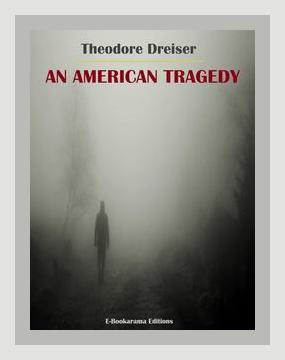Summary of “An American Tragedy” by Theodore Dreiser
Introduction
“An American Tragedy,” penned by Theodore Dreiser and first published in 1925, is a monumental work of American literature that delves into the complexities of ambition, morality, and social class. This novel, classified under the genre of naturalistic fiction, explores the harrowing consequences of an individual’s pursuit of the American Dream. With its intricate character studies and critical social commentary, Dreiser crafts a narrative that remains both compelling and poignant.
Key Plot Points
Early Life and Ambitions
The story begins with Clyde Griffiths, a young man from a poor, religious family in a small Midwestern town. Clyde is eager to escape his humble beginnings and achieve success and status. His initial aspirations are modest, but he soon becomes entangled in a world of wealth and social climbing. Clyde’s ambition drives him to leave his family and seek opportunities in the bustling city of Chicago. His journey reflects the broader American desire for upward mobility, yet it is marked by moral compromise and personal disillusionment.
Example 1: Clyde’s first job in Chicago is at a local hotel, where he becomes infatuated with a wealthy guest, Sondra Finchley. This relationship becomes a crucial turning point, as Clyde’s aspirations become intricately linked to Sondra’s social status.
The Central Conflict: The Love Triangle
Clyde’s relationship with Sondra evolves, and he becomes increasingly involved in her affluent social circle. At the same time, Clyde maintains a relationship with Roberta Alden, a working-class girl who becomes pregnant. The tension between his two worlds creates a moral and emotional conflict. Clyde’s attempts to juggle these relationships reveal his internal struggle between personal desires and societal expectations.
Example 2: When Clyde is faced with the impending birth of Roberta’s child, he grapples with the decision to either acknowledge his responsibility or escape the situation. His choice to distance himself from Roberta and the unborn child highlights his moral failings and the harsh realities of social class disparities.
The Tragic Outcome
Clyde’s desperation culminates in a tragic event when he devises a plan to eliminate Roberta. He arranges a boat trip with her and deliberately causes her death by drowning, hoping to escape the consequences of his actions. This drastic measure illustrates Clyde’s willingness to sacrifice others for his own gain, embodying the novel’s central theme of the corrupting influence of ambition.
Example 3: The trial and subsequent conviction of Clyde for Roberta’s murder serve as a dramatic conclusion to the story. The court proceedings and Clyde’s eventual execution underscore the tragic irony of his downfall—a man who sought to escape his circumstances only to be ensnared by his own ambitions.
Character Development
Clyde Griffiths
Clyde Griffiths is the central character, whose evolution from a naïve youth to a morally compromised individual is depicted with acute psychological insight. Dreiser portrays Clyde as a complex figure, driven by both ambition and internal conflict. His character embodies the naturalistic elements of the novel, showing how his environment and personal choices shape his tragic fate.
Quote 1: “Clyde, in the middle of his ambitions, was like a blind man walking along a cliff’s edge.” This quote captures Clyde’s precarious position between his dreams and the moral pitfalls that ultimately lead to his downfall.
Roberta Alden
Roberta Alden, Clyde’s ill-fated lover, represents the working-class world that contrasts sharply with Sondra Finchley’s privileged life. Roberta’s tragic fate underscores the class disparities and gender inequalities of the time. Her character elicits sympathy and highlights the personal toll of Clyde’s moral failures.
Quote 2: “She was a girl of humble beginnings, yet with a spirit that might have soared had fate permitted.” This quote emphasizes Roberta’s potential and the tragic waste of her life due to Clyde’s actions.
Sondra Finchley
Sondra Finchley, the wealthy and influential woman Clyde desires, symbolizes the allure of upper-class success and the superficiality that accompanies it. Her role in the story accentuates the contrast between Clyde’s two worlds and the ultimate futility of his aspirations.
Quote 3: “To Sondra, Clyde was but a stepping stone to greater things, a transient figure in the larger tableau of her privileged life.” This quote reflects Sondra’s view of Clyde and highlights the disconnect between his ambitions and her indifference.
Major Themes
The Corrupting Influence of Ambition
“An American Tragedy” explores how the relentless pursuit of success can lead to moral corruption and personal destruction. Clyde’s ambition drives him to make unethical decisions, ultimately resulting in his tragic downfall.
Social Class and Inequality
Dreiser examines the stark contrasts between social classes, illustrating how economic disparity influences personal relationships and individual choices. The novel critiques the idea that material success equates to happiness or moral superiority.
The Illusion of the American Dream
The novel scrutinizes the American Dream, revealing its inherent flaws and the disillusionment that can accompany its pursuit. Clyde’s failure to achieve his dreams despite his efforts underscores the novel’s critique of the myth of unrestrained success.
Conclusion
“An American Tragedy” by Theodore Dreiser remains a powerful exploration of ambition, morality, and social class. The novel’s detailed portrayal of Clyde Griffiths’ rise and fall serves as a stark reminder of the potential consequences of an unchecked pursuit of success. Its critical examination of societal values and individual choices continues to resonate, offering valuable insights into the human condition and the complexities of the American Dream. Dreiser’s work endures as a significant literary piece, challenging readers to reflect on their own aspirations and ethical boundaries.
